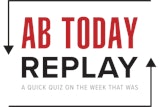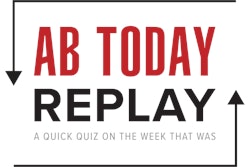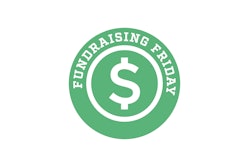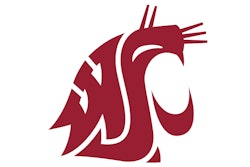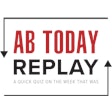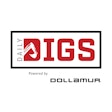Ignoring the home front blunts the benefits of trade-show attendance
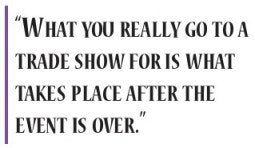
Trade shows are great for discovering new equipment and making new contacts. All too often, though, attendees return to mountains of backed-up work. Faced with the challenge of catching up on workaday tasks, they soon forget their good intentions to follow up with vendors, cultivate personal relationships and capitalize on industry trends revealed at the show.
It shouldn't be that way. "What you really go to a trade show for is what takes place after the event is over," says Francis J. Friedman, a trade-show specialist and president of Time & Place Strategies, a New York City-based consulting firm. Like golfers working on their follow-through, successful tradeshow attendees are always trying to improve the quality of their after-show swing. That means sharing knowledge with staff members, placing follow-up calls with the right exhibitors, and organizing business cards and notes so they don't end up shoved into a drawer somewhere.
Trade shows offer attendees concentrated exposure to a vast array of information that is well organized and presented. Still, their benefits won't be realized fully unless you capitalize on what's learned after you return home:
• Share the Wealth. If one piece of new information from a show can profit you, imagine the results if your whole staff could use the same knowledge. Make sure everyone has an opportunity to benefit from trade-show information, be it educational information from seminars, industry insights gathered from business peers or new product descriptions from the exhibit floor. This communication may be delivered via memo, meeting or internal e-mail. The key is to disburse the information formally so that it is taken seriously.
Don't forget communication is a two-way street. Encourage your personnel to share insights that may enhance or alter your view of what happened at the show. This is particularly important when deciding whether to take on a new line of equipment. "Your staff may know of products that are a better fit and should be compared and investigated," says Richard J. Brunkan, a partner at psychological consultant Humber, Mundie and McClary of Milwaukee. "You may discover that you were being overwhelmed by an enthusiastic salesperson."
Good post-show follow-through depends to a great extent on advance planning. If more than one person from your business will be attending the show, assign different duties to each. Personal beats might include new products, industry trends and programming ideas. To encourage great work, make sure each attendee realizes a report will be expected back home. "People engage in a very different level of note-taking when they realize they will be held responsible for teaching others," says Pittsburgh-based consultant Mina Bancroft. "They realize they will really need to understand a subject." Finally, assign a high priority to the meeting in which knowledge is shared. "Prior to attending the show, schedule the follow-up meeting on your calendar so it doesn't slip between the cracks later," suggests Bancroft.
Draw upon each person's abilities when conveying information to your staff. "Because each person has unique strengths, each communicates in a different way and sees a trade show from a personal perspective," says Donna Messer, a trade-show consultant and president of ConnectUs Communications, a consultancy in Oakville, Ontario. "Some learn by hearing, some by seeing, some by experiencing. Each person attending the show will describe what he or she saw in different ways. Encourage this and you will have one heck of a team."
Printed materials should be given a similarly systematic treatment. Seminar handouts, as well as your handwritten notes - organized and typewritten upon your return - should be copied and distributed to key personnel.
• Follow Through with Vendors. Exhibitors can be as forgetful as buyers once the show is over. If they move on to other things and fail to send promised information, everyone loses. Smart attendees will mark their calendars to remind laggard vendors.
Following through with vendors promptly reduces the risk of misunderstanding. Your memory of what an exhibitor said may differ from that of the vendor's, and the latter may forget a deal that was not put in writing because of the rush of people at the show. So call and nail down your agreements.
Vendors will offer you a plethora of brochures and catalogs as you walk the aisles. When you return home, a stack of accumulated brochures can seem so overwhelming that you avoid looking at them for months. To avoid this situation, ask vendors to mail catalogs and brochures to you, and assign a staff member to file them in an accessible way. You might want to sort the catalogs alphabetically by company, or create a computer database that references the company names by product or service for rapid access months later.
And what about all those business cards collected during the show? Too often they remain wrapped in their rubber-band cocoons, never to be looked at again. Try categorizing business cards on a scale of one through four, with "one" being the most important to contact. Once back home, make sure you call the "one" cards first. "I advocate writing relevant information on the back of the cards rather than on a separate piece of paper," says Brunkan. "That avoids having to match things up later. On each card, note what was interesting about the product and what needs follow-up."
If it all sounds like smart networking, that's because it is. Trade-show experts encourage such relationship building. "When an attendee actually follows through with vendors met at a show, a light goes on with suppliers," says Messer. "They say, 'This is one I want to keep.' " The results can be beneficial. "Down the road, you may be called for a testimonial, or you may be offered something to try out because you have been responsive," says Messer. And, of course, you will be the first to know of any buying opportunities.
• Inform Your Customers. Co-workers and vendors are important, but it's the customer who is the ultimate reason for all of this trade-show commotion. Eventually, of course, the public will see the results of your visit, but why not be proactive? Current or potential members should be made aware of what you have seen at the show, via either a special mailing or a section of your regular newsletter devoted to a report on what you learned at a specific trade show. And don't discount other forms of creative communication, such as a personal call to your facility's most avid users, or a special page on your facility's web site.
In a word, profiting from trade-show attendance means prioritizing - both by making the organizing of information as important as the gathering, and by breaking up that big pile of new information into manageable pieces. "When you get back to your place of work, the important thing is to have a plan," says Bancroft. "I suggest that you start processing the information while you are still at the show, and especially as you travel back home. Ask yourself, 'What is the top thing I have learned and what will I do with it?' " Prioritizing ensures that information overload doesn't overwhelm your new-found knowledge.













